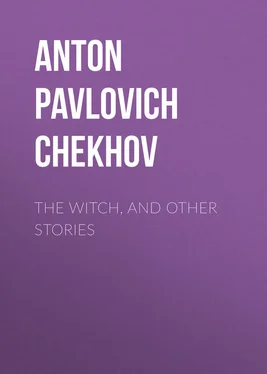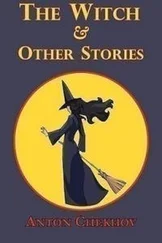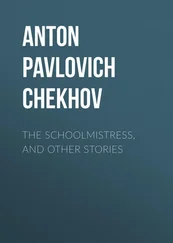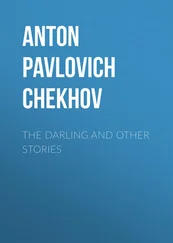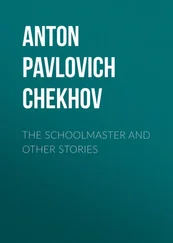Anton Chekhov - The Witch, and Other Stories
Здесь есть возможность читать онлайн «Anton Chekhov - The Witch, and Other Stories» — ознакомительный отрывок электронной книги совершенно бесплатно, а после прочтения отрывка купить полную версию. В некоторых случаях можно слушать аудио, скачать через торрент в формате fb2 и присутствует краткое содержание. Жанр: Старинная литература, Русская классическая проза, на английском языке. Описание произведения, (предисловие) а так же отзывы посетителей доступны на портале библиотеки ЛибКат.
- Название:The Witch, and Other Stories
- Автор:
- Жанр:
- Год:неизвестен
- ISBN:нет данных
- Рейтинг книги:5 / 5. Голосов: 1
-
Избранное:Добавить в избранное
- Отзывы:
-
Ваша оценка:
- 100
- 1
- 2
- 3
- 4
- 5
The Witch, and Other Stories: краткое содержание, описание и аннотация
Предлагаем к чтению аннотацию, описание, краткое содержание или предисловие (зависит от того, что написал сам автор книги «The Witch, and Other Stories»). Если вы не нашли необходимую информацию о книге — напишите в комментариях, мы постараемся отыскать её.
The Witch, and Other Stories — читать онлайн ознакомительный отрывок
Ниже представлен текст книги, разбитый по страницам. Система сохранения места последней прочитанной страницы, позволяет с удобством читать онлайн бесплатно книгу «The Witch, and Other Stories», без необходимости каждый раз заново искать на чём Вы остановились. Поставьте закладку, и сможете в любой момент перейти на страницу, на которой закончили чтение.
Интервал:
Закладка:
“I like the river and the forest and the village,” Elena Ivanovna went on; “I could live here all my life, and I feel as though here I should get strong and find my place. I want to help you – I want to dreadfully – to be of use, to be a real friend to you. I know your need, and what I don’t know I feel, my heart guesses. I am sick, feeble, and for me perhaps it is not possible to change my life as I would. But I have children. I will try to bring them up that they may be of use to you, may love you. I shall impress upon them continually that their life does not belong to them, but to you. Only I beg you earnestly, I beseech you, trust us, live in friendship with us. My husband is a kind, good man. Don’t worry him, don’t irritate him. He is sensitive to every trifle, and yesterday, for instance, your cattle were in our vegetable garden, and one of your people broke down the fence to the bee-hives, and such an attitude to us drives my husband to despair. I beg you,” she went on in an imploring voice, and she clasped her hands on her bosom – “I beg you to treat us as good neighbours; let us live in peace! There is a saying, you know, that even a bad peace is better than a good quarrel, and, ‘Don’t buy property, but buy neighbours.’ I repeat my husband is a kind man and good; if all goes well we promise to do everything in our power for you; we will mend the roads, we will build a school for your children. I promise you.”
“Of course we thank you humbly, lady,” said Lytchkov the father, looking at the ground; “you are educated people; it is for you to know best. Only, you see, Voronov, a rich peasant at Eresnevo, promised to build a school; he, too, said, ‘I will do this for you,’ ‘I will do that for you,’ and he only put up the framework and refused to go on. And then they made the peasants put the roof on and finish it; it cost them a thousand roubles. Voronov did not care; he only stroked his beard, but the peasants felt it a bit hard.”
“That was a crow, but now there’s a rook, too,” said Kozov, and he winked.
There was the sound of laughter.
“We don’t want a school,” said Volodka sullenly. “Our children go to Petrovskoe, and they can go on going there; we don’t want it.”
Elena Ivanovna seemed suddenly intimidated; her face looked paler and thinner, she shrank into herself as though she had been touched with something coarse, and walked away without uttering another word. And she walked more and more quickly, without looking round.
“Lady,” said Rodion, walking after her, “lady, wait a bit; hear what I would say to you.”
He followed her without his cap, and spoke softly as though begging.
“Lady, wait and hear what I will say to you.”
They had walked out of the village, and Elena Ivanovna stopped beside a cart in the shade of an old mountain ash.
“Don’t be offended, lady,” said Rodion. “What does it mean? Have patience. Have patience for a couple of years. You will live here, you will have patience, and it will all come round. Our folks are good and peaceable; there’s no harm in them; it’s God’s truth I’m telling you. Don’t mind Kozov and the Lytchkovs, and don’t mind Volodka. He’s a fool; he listens to the first that speaks. The others are quiet folks; they are silent. Some would be glad, you know, to say a word from the heart and to stand up for themselves, but cannot. They have a heart and a conscience, but no tongue. Don’t be offended… have patience… What does it matter?”
Elena Ivanovna looked at the broad, tranquil river, pondering, and tears flowed down her cheeks. And Rodion was troubled by those tears; he almost cried himself.
“Never mind…” he muttered. “Have patience for a couple of years. You can have the school, you can have the roads, only not all at once. If you went, let us say, to sow corn on that mound you would first have to weed it out, to pick out all the stones, and then to plough, and work and work… and with the people, you see, it is the same… you must work and work until you overcome them.”
The crowd had moved away from Rodion’s hut, and was coming along the street towards the mountain ash. They began singing songs and playing the concertina, and they kept coming closer and closer…
“Mamma, let us go away from here,” said the little girl, huddling up to her mother, pale and shaking all over; “let us go away, mamma!
“Where?”
“To Moscow… Let us go, mamma.”
The child began crying.
Rodion was utterly overcome; his face broke into profuse perspiration; he took out of his pocket a little crooked cucumber, like a half-moon, covered with crumbs of rye bread, and began thrusting it into the little girl’s hands.
“Come, come,” he muttered, scowling severely; “take the little cucumber, eat it up… You mustn’t cry. Mamma will whip you… She’ll tell your father of you when you get home. Come, come…”
They walked on, and he still followed behind them, wanting to say something friendly and persuasive to them. And seeing that they were both absorbed in their own thoughts and their own griefs, and not noticing him, he stopped and, shading his eyes from the sun, looked after them for a long time till they disappeared into their copse.
The engineer seemed to grow irritable and petty, and in every trivial incident saw an act of robbery or outrage. His gate was kept bolted even by day, and at night two watchmen walked up and down the garden beating a board; and they gave up employing anyone from Obrutchanovo as a labourer. As ill-luck would have it someone (either a peasant or one of the workmen) took the new wheels off the cart and replaced them by old ones, then soon afterwards two bridles and a pair of pincers were carried off, and murmurs arose even in the village. People began to say that a search should be made at the Lytchkovs’ and at Volodka’s, and then the bridles and the pincers were found under the hedge in the engineer’s garden; someone had thrown them down there.
It happened that the peasants were coming in a crowd out of the forest, and again they met the engineer on the road. He stopped, and without wishing them good-day he began, looking angrily first at one, then at another:
“I have begged you not to gather mushrooms in the park and near the yard, but to leave them for my wife and children, but your girls come before daybreak and there is not a mushroom left…Whether one asks you or not it makes no difference. Entreaties, and friendliness, and persuasion I see are all useless.”
He fixed his indignant eyes on Rodion and went on:
“My wife and I behaved to you as human beings, as to our equals, and you? But what’s the use of talking! It will end by our looking down upon you. There is nothing left!”
And making an effort to restrain his anger, not to say too much, he turned and went on.
On getting home Rodion said his prayer, took off his boots, and sat down beside his wife.
“Yes…” he began with a sigh. “We were walking along just now, and Mr. Kutcherov met us… Yes… He saw the girls at daybreak… ‘Why don’t they bring mushrooms,’… he said ‘to my wife and children?’ he said… And then he looked at me and he said: ‘I and my wife will look after you,’ he said. I wanted to fall down at his feet, but I hadn’t the courage… God give him health… God bless him!..”
Stephania crossed herself and sighed.
“They are kind, simple-hearted people,” Rodion went on. “‘We shall look after you.’… He promised me that before everyone. In our old age… it wouldn’t be a bad thing… I should always pray for them… Holy Mother, bless them…”
The Feast of the Exaltation of the Cross, the fourteenth of September, was the festival of the village church. The Lytchkovs, father and son, went across the river early in the morning and returned to dinner drunk; they spent a long time going about the village, alternately singing and swearing; then they had a fight and went to the New Villa to complain. First Lytchkov the father went into the yard with a long ashen stick in his hands. He stopped irresolutely and took off his hat. Just at that moment the engineer and his family were sitting on the verandah, drinking tea.
Читать дальшеИнтервал:
Закладка:
Похожие книги на «The Witch, and Other Stories»
Представляем Вашему вниманию похожие книги на «The Witch, and Other Stories» списком для выбора. Мы отобрали схожую по названию и смыслу литературу в надежде предоставить читателям больше вариантов отыскать новые, интересные, ещё непрочитанные произведения.
Обсуждение, отзывы о книге «The Witch, and Other Stories» и просто собственные мнения читателей. Оставьте ваши комментарии, напишите, что Вы думаете о произведении, его смысле или главных героях. Укажите что конкретно понравилось, а что нет, и почему Вы так считаете.
